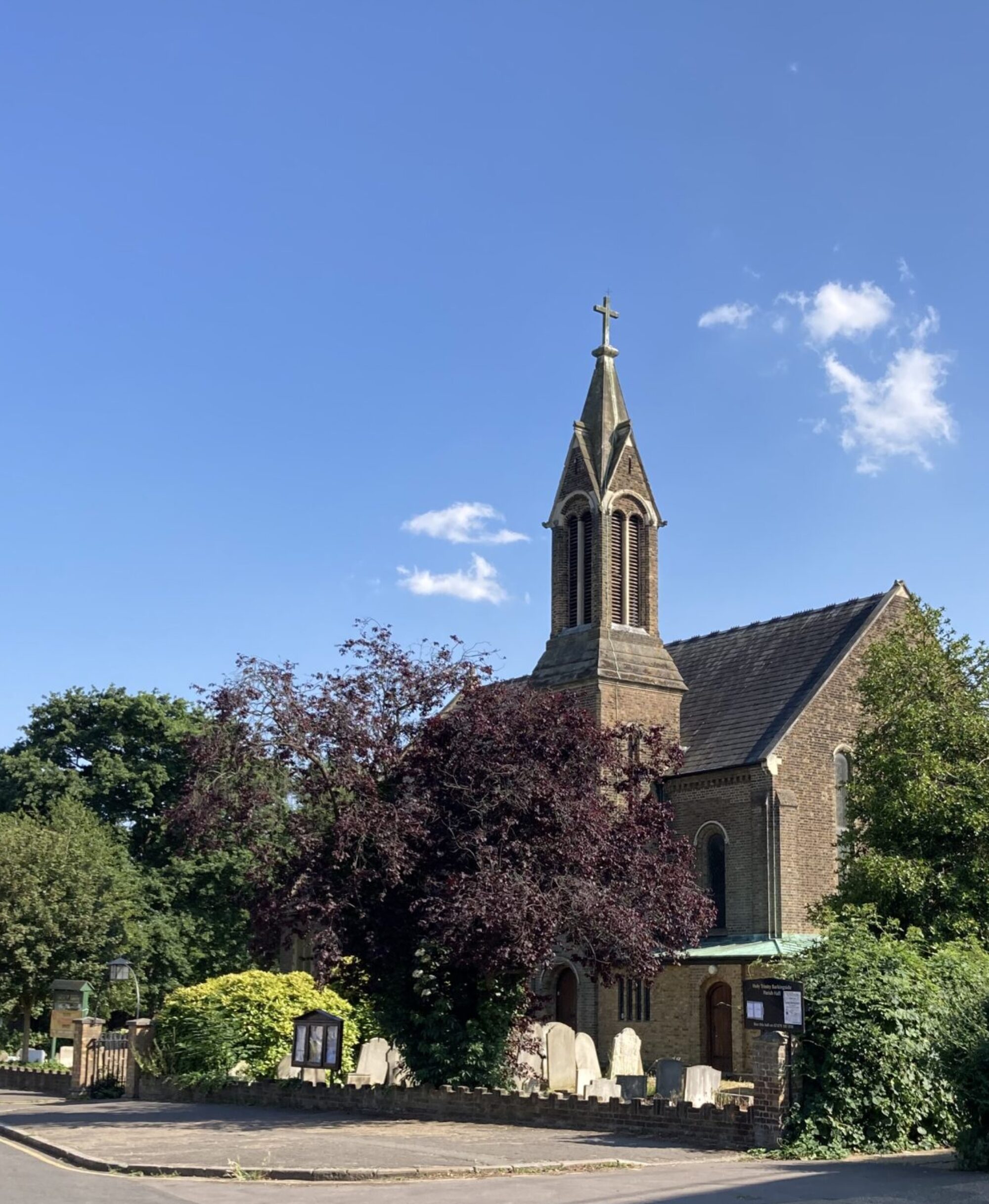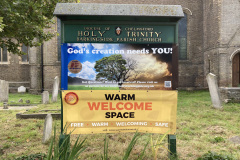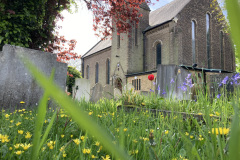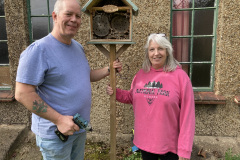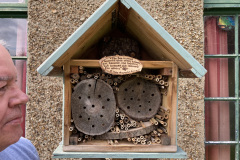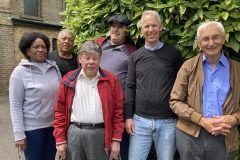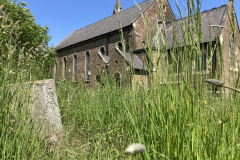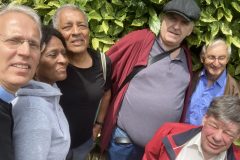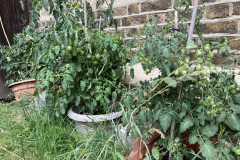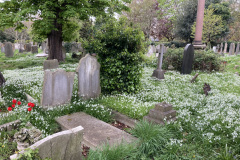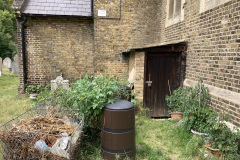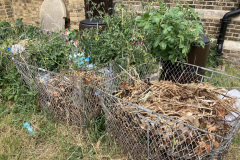Welcome to Eco Church!
We have a heart for the Environment and all of Creation and see ourselves as part of Christian Climate Action. We plant vegetables and flowers in our churchyard, and we have been awarded the Eco Church Bronze Award. In the past, we have maintained a bee hotel, and we have come together for litter picking.
We have an Eco Church Team. This is what is on our hearts – these are our aspirations:
- To integrate the environment into our worship and give space to voice Climate Action issues;
- to maintain a clean churchyard;
- to maintain flower beds with wide-ranging plants and grow more vegetables;
- to provide info about animal life in our churchyard;
- to plant fruit trees and harness rainwater;
- to get local schools involved in Eco projects;
- to make our churchyard more accessible & safer.
Currently, we are also looking into installing Solar Panels and finding non-fossil fuel heating for our church.
We want to work with the Council (who maintains our churchyard) and other partners on these aspirations and to create a space where all of God’s creation will thrive.
Any questions? Want to get involved? Please get in touch with our Church Office. We would love to hear from you!
Further Information
For “Eco Church” and its award schemes for churches who want to demonstrate that the gospel is good news for God’s earth, see https://ecochurch.arocha.org.uk/
For the Church of England Environment Programme, see
https://www.churchofengland.org/about/church-england-environment-programme
For local environmental projects we admire, see
- the award-winning churchyard at St Mary’s Walthamstow – see https://www.stmaryswalthamstow.org/churchyard/;
- East Ham Nature Reserve – see https://www.parksandgardens.org/places/east-ham-nature-reserve;
- Walthamstow Wetlands – see https://www.wildlondon.org.uk/walthamstow-wetlands-nature-reserve.
Web-Based Sources of Environmental Information
Intergovernmental Panel on Climate Change (UN’s body for assessing the science related to climate change): https://www.ipcc.ch/
United Nations Climate Action: https://www.un.org/en/climatechange
National Center for Atmospheric Research: https://ncar.ucar.edu/
National Centers for Environmental Information: https://www.ncei.noaa.gov/
Skeptical Science: https://skepticalscience.com/
Center for Climate & Energy Solutions: https://www.c2es.org/
***
Resources from the Diocese of Chelmsford
Environment: https://www.chelmsford.anglican.org/about-us/our-faith-in-action/caring-for-the-environment
Climate Justice is Racial Justice: https://www.chelmsford.anglican.org/climate-justice-is-racial-justice
***
Blogs
IMGBlog on Climate Change: https://www.imf.org/en/Blogs
NASA: Global Climate Change Blog: https://climate.nasa.gov/explore/ask-nasa-climate/?page=0&per_page=40&order=publish_date+desc%2C+created_at+desc&search=&hide_filter_bar=true&grid_list_klass=full_news_list&category=25
***
Books
Bookless, Dave, Planetwise. Dare to Care for God’s World (Nottingham, 2008)
Butler, Octavia, Parable of the Sower (2019)
Christian Climate Action, Time to Act. A resource book by the Christians in Extinction Rebellion (London, 2020)
Church of England, A Time for Creation. Liturgical Resources for Creation and the Environment (London, 2020)
Foster, Claire & David Shreeve, Leading your Church through a Changing Climate (London, 2008)
Hinkel, Jason, Less is More: How Degrowth Will Save the World (London, 2021)
Klein, Naomi, This Changes Everything: Capitalism vs the Climate
Pope Francis, Encyclical on Climate Change & Inequality. On Care for Our Common Home (London, 2015)
Powers, Richard, The Overstory (London, 2019)
Valero, Ruth, Saying Yes to Life (London, 2020)
Wallace-Wells, David, The Uninhabitable Earth. A Story of the Future (London, 2019)
Wall Kimmerer, Robin, Braiding Sweetgrass: Indigenous Wisdom, Scientific Knowledge and the Teachings of Plants (London, 2020)
***
Two Reflections you might like …
Encountering God in Wild Places
Theologian Tony Jones writes of the gifts available when we encounter God in “wild places”:
The God of wild places offers peace. In a modern world that’s frenetic and busy—always connected, always on—finding peace is getting more difficult… To receive the peace offered by the God of wild places, we’ll have to retrograde to old technologies: canoe and paddle; hiking boots and walking stick; bow and arrow and fishing pole. We also have to remember that the peace we long for is within, a spark of the divine that resides within each of us. To bring that spark to a flame can be done indoors, but I have a lot more luck when I’m outdoors—and the wilder the place the better.
The God of wild places honors place. When we visit and revisit the wild places that are special to us, experiences of transcendence are waiting for us there… I’ve sung a hymn to my most special place, a few acres of northern forest sitting on the edge of a lake. Caretaking that land is a joy and a privilege, and it’s become clear to me that doing so is part of my vocation, my calling from God. These trees and this creek are my congregation to pastor as a shepherd cares for sheep—they were torn asunder by a tornado, as was I; they have regrown in scarred beauty, as have I…. These days I’m zealous in maintaining these woods, guarding and protecting them, doing what I can to keep them healthy and safe, safeguarding their peace.
The God of wild places has given us companions. We may be hurtling through space … but we’re not alone. We are interdependent on a whole fabric of creation, woven together with beings sentient and non-sentient, animate and inanimate…. I’ve stopped looking up to the sky for help and instead lowered my eyes to the companions around me. My dogs have been my most sacred non-human companions. [My friend] Seth talks to plants. No matter the species with which we commune, the key is keeping the whole web in view—seeing the forest and the trees, for God’s love pulses through the web.
Jones describes how taking risks invites greater reliance on God:
The God of wild places requires risk. We’ve done everything we can to mitigate risk to ourselves, an admirable trait that has ensured the propagation of our species…. On a neurological level, adventure facilitates deep learning. On a spiritual level, high-risk situations strip us bare and make us vulnerable. When my ego recedes, there’s more room for God. Attaining the next level of success requires taking a chance: climbing a bigger mountain, hiking a more challenging trail, riding a bigger wave…. Modern life tends to inoculate us against these risks, but the God of wild places peels away that safety and brings us back in touch with who we’re meant to be.
https://cac.org/daily-meditations/encountering-god-in-wild-places/
***
A Place of Belonging
Father Richard describes Francis of Assisi’s early days of ministry and how he related to nature:
Francis sets out on the road, excited because he knows his vocation is to be a contemplative, spending time in nature in solitude and prayer, and to be in active ministry and to preach to people what he’s experienced. Along the way, he sees a tree filled with birds. He approaches the tree and the birds don’t fly away, so he starts talking to them. We have several accounts of this first sermon which is not to human beings but to animals, to birds. Maybe it’s been romanticized, but the story is that they stayed and listened to him. At the end of the sermon he says, now go off, because I’ve told you who you are.
For the rest of his life, Francis is in relationship with a variety of animals, birds, fish, trees, and flowers. He always tells these creatures, “Do you realize that by your very existence, you are inherently giving glory to God? So just be who you are. Every animal, every created being has a unique thing to do. Each of you, do your thing; and in that doing, you are giving glory to God!” He would take delight in everything doing its thing. This is a mutual mirroring and I think it allowed him to do his own thing. He realized that just by being Francis, in all his freedom and joy, he also was giving glory to God. He has no trouble being alone because mirrors are everywhere.
The only reason I can talk about Francis’ relationship with nature with some confidence is because it’s honestly what I have experienced on my Lenten retreats in the desert. I know it may sound fanciful, but everything becomes a mirror—whether the shape of rocks or the color. I’d collect a whole pile of rocks by the end of the five weeks because they were always naming something about me, and I didn’t even know what it was. All I’m saying is the whole world comes to life: every kind of cactus, every kind of tree or dead branch, the sunrise, the sunset, the different kinds of birds. I find myself in the middle of a universe of belonging.
David Whyte echoes this message in his poem “The Sun.” Father Richard shares an excerpt:
… I want to walk
through life
amazed and inarticulate
with thanks….
I want to know
when I lean down to the lilies
by the water
and feel their small and
perfect reflection
on my face….
I want to know
what I am
and what I am
involved with by loving
this world
as I do….
I want to be found by love,
… I want to come alive
in the holiness
of that belonging.
https://cac.org/daily-meditations/a-place-of-belonging/
